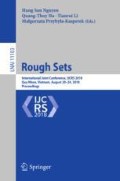Abstract
Technically put, a metaphor is a conceptual mapping between two domains, which allows one to better understand the target domain; as Lakoff and Núñes put it, the main function of a metaphor is to allow us to reason about relatively abstract domains using the inferential structure of relatively concrete domains. In the paper we would like to apply this idea of framing one domain through conceptual settings of another domain to rough set theory (RST). The main goal is to construe rough sets in terms of the following mathematical metaphor: RST is a modular set-arithmetic. That is, we would like to map/project modular arithmetic onto rough sets, and, as a consequence, to redefine the fundamental concepts/objects of RST. Specifically, we introduce new topological operators (which play a similar role as remainders in modular arithmetic), discuss their formal properties, and finally apply them to the problem of vagueness (which has been intertwined with RST since the 1980’s).
Access this chapter
Tax calculation will be finalised at checkout
Purchases are for personal use only
Notes
- 1.
A very interesting discussion of these problems may be found in Krajewski [5].
- 2.
Although Chakraborty’s question makes perfect sense for abstract approximation spaces, the case of decision tables is a bit different: here the set X represents a decision attribute, which – although well known – still needs to be approximated by means of conditional attributes.
- 3.
\(X\uplus Y = (X\setminus Y) \cup (Y\setminus X)\).
- 4.
The modular representation is not – however – equivalent to a rough set, e.g., if \(\underline{X} = \emptyset \), then \((\underline{X},\overline{X})\) usually represents/approximates more than a single set. However, the modular representation is \((X,\mathbf d (X))\), which stands for X alone.
References
Bernstein, B.A.: Operations with respect to which the elements of a Boolean algebra form a group. Trans. Am. Math. Soc. 26(2), 171–175 (1924)
Jones, W.B.: Modular Arithmetic. Blaisdell, New York (1964)
Chakraborty, M.: On some issues in the foundation of rough sets. Fundamenta Informaticae 148(1–2), 123–132 (2016)
Clark, P.: Notes on general topology. https://pdfs.semanticscholar.org/fc7e/e8ebdfcec468f1317cf37673e2292e46ff6d.pdf
Krajewski, S.: Theological metaphors in mathematics. Stud. Log. Gramm. Rhetoric 44(57), 13–30 (2016)
Lakoff, G., Núñez, R.E.: Where Mathematics Comes From. Basic Books, New York (2000)
Marek, V.M., Truszczyński, M.: Contributions to the theory of rough sets. Fundamenta Informaticae 39(4), 389–409 (1999)
Pawlak, Z.: Rough sets. Int. J. Comput. Inf. Sci. 11, 341–356 (1982)
Pawlak, Z.: Rough Sets: Theoretical Aspects of Reasoning about Data. Kluwer Academic Publisher, Dordrecht (1991)
Pawlak, Z.: An inquiry into vagueness and uncertainty. Institute of Computer Science report 29/94. Warsaw University of Technology (1994)
Pervin, W.J.: Foundations of General Topology. Academic Press, New York (1964)
Skowron, A.: Rough sets and vague concepts. Fundamenta Informaticae 64(1–4), 417–431 (2005)
Skowron, A., Swiniarski, R.: Rough sets and higher order vagueness. In: Ślęzak, D., Wang, G., Szczuka, M., Düntsch, I., Yao, Y. (eds.) RSFDGrC 2005. LNCS (LNAI), vol. 3641, pp. 33–42. Springer, Heidelberg (2005). https://doi.org/10.1007/11548669_4
Weiner, J.: Science and semantics: the case of vagueness and supervaluation. Pac. Philos. Q. 88(3), 355–374 (2007)
Willard, S.: General Topology. Addison-Wesley Publishing Co., Reading (1970)
Wiweger, A.: On topological rough sets. Bull. Pol. Acad. Scie. Math. 37, 89–93 (1989)
Acknowledgements
We are greatly indebted to anonymous referees for their valuable comments and corrections.
Author information
Authors and Affiliations
Corresponding author
Editor information
Editors and Affiliations
Rights and permissions
Copyright information
© 2018 Springer Nature Switzerland AG
About this paper
Cite this paper
Wolski, M., Gomolińska, A. (2018). A Metaphor for Rough Set Theory: Modular Arithmetic. In: Nguyen, H., Ha, QT., Li, T., Przybyła-Kasperek, M. (eds) Rough Sets. IJCRS 2018. Lecture Notes in Computer Science(), vol 11103. Springer, Cham. https://doi.org/10.1007/978-3-319-99368-3_9
Download citation
DOI: https://doi.org/10.1007/978-3-319-99368-3_9
Published:
Publisher Name: Springer, Cham
Print ISBN: 978-3-319-99367-6
Online ISBN: 978-3-319-99368-3
eBook Packages: Computer ScienceComputer Science (R0)

